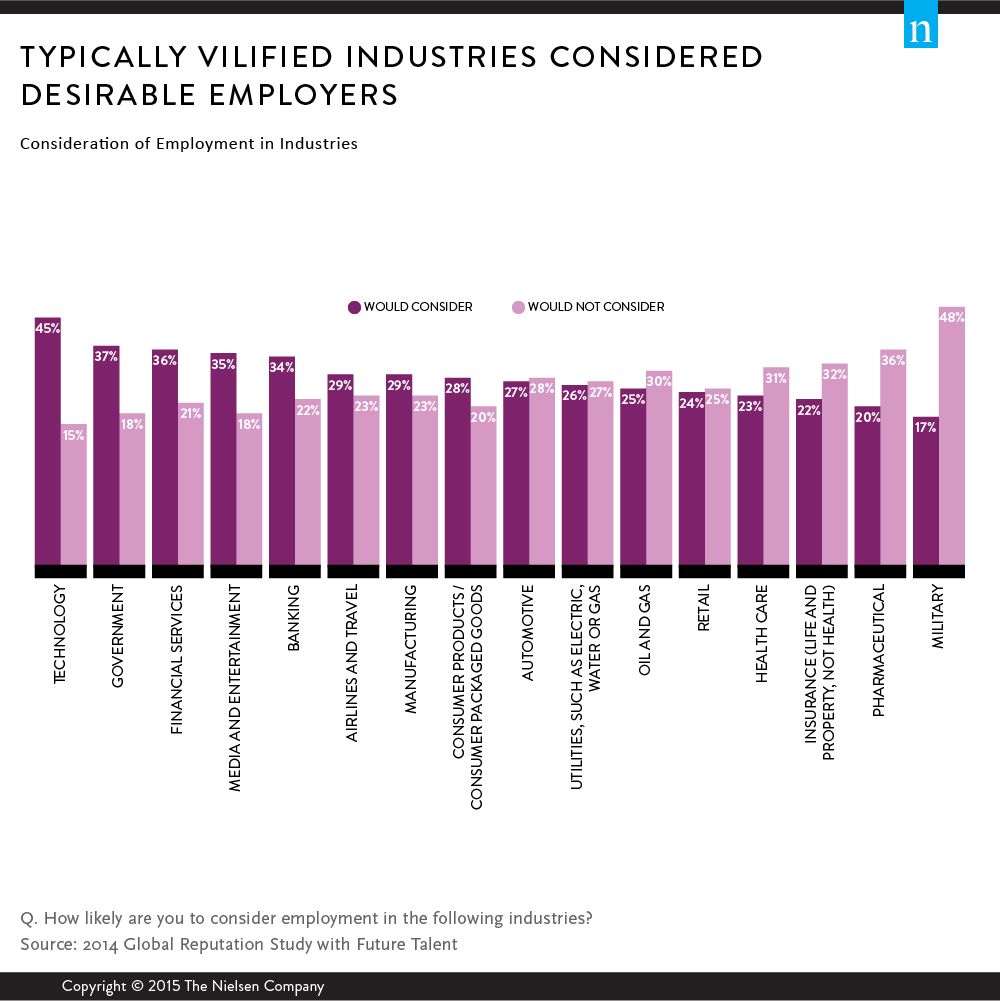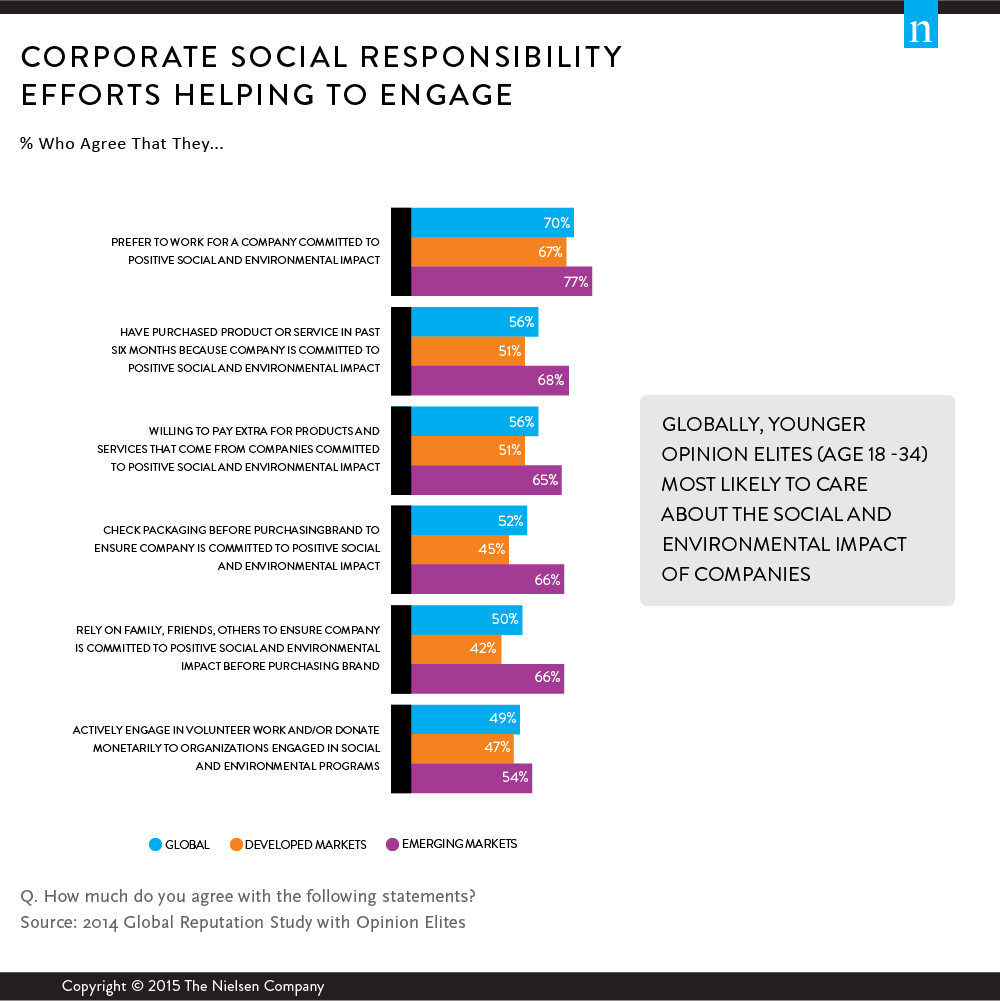Not too long ago, when people wanted to know if it was a good idea to work for a particular company, they might have asked friends and neighbors what they knew about that place of business. Now, with social media and online company ratings sites like Glassdoor.com, people have many additional ways to research a company before the job application is even sent. In today’s digitally connected world, a company’s negative reputation could not only undermine consumer purchasing decisions, the company also could experience difficulties in securing new, long-term employees.
A recent survey in 16 countries about corporate reputation found that Future Talent—students close to graduating or college-educated, newly working professionals—are influenced by both online and offline sources when deciding where to work. In fact, global Future Talent say the channels that have the most influence on their decision to work for a company are discussions with friends, colleagues and family (34%), company websites (32%), discussions with company representatives/employees (29%), company career sites (26%) and search engines (26%). Although mobile applications (“apps”) are not among the top sources overall, they play more of an influential role in emerging markets than in developed markets, which might be reflective of the rapid adoption of mobile technology in emerging markets in recent years. India (26%), Mexico (21%), Brazil (21%) and China (20%) are the most likely to view mobile apps as influential.
To study how influential individuals around the world learn about companies, the survey explored how corporate reputation factors into Future Talent’s path to employment. A similar survey sought to understand attitudes toward corporate reputation among Opinion Elites, a subset of the general public who are more informed, engaged and active when it comes to social and business issues.
Bad Rap?
While today’s Future Talent tend to carefully explore potential employers, they also keep an open mind as they do so. More than a third say they are willing to consider working in three industries with known weaker reputations—government, financial services and banking. Younger Opinion Elites, between 18-34 years old, also view these industries more favorably than their older peers.

However, some of this apparent open-mindedness could reflect that 65% of global Future Talent believe employment opportunities are limited in their respective country. Therefore, opportunities should be seized, even if they aren’t “perfect.” Despite these individuals’ willingness to take opportunities that aren’t just right, they’re not resigned to getting stuck in jobs that don’t suit them. Global Future Talent who have been working for three to five years are the most open to considering employment across different industries. And government, financial services and banking are seen as some of the most attractive for those working three to five years, as well as technology and media/entertainment.
So what factors influence Future Talent’s willingness to take employment in these reputationally challenged industries? The company’s reputation and providing a good cultural fit are highly important factors for those who would consider employment in such fields.
Outside of industries, almost half (48%) of Future Talent say they prefer to work for global multi-national companies, while 28% prefer national/domestic-based companies, and 22% are open to a company’s footprint. These large, global companies may offer Future Talent the best mix of their top considerations (salary and benefits aside) when looking for a job: 44% feel growth and advancement opportunities are much more important than other factors, followed by work/life balance (43%) and employee treatment (41%). A further 30% believe it is highly important that their job/work gives them the ability to make a difference. Global Future Talent are split in terms of working for nonprofits (48%) versus for-profits (52%); privately held (52%) versus publicly held (48%); and entrepreneurial (52%) versus mature (48%) companies. And these differences of opinion could indicate Future Talent’s openness to multiple options given their concerns over limited job opportunities.
Doing Good…On and Off the Clock
In line with Future Talent’s focus being able to “do good” in their employment, 70% of Opinion Elites globally say they prefer to work for a company that is committed to positive social and environmental impact. This is even more important to those in emerging markets (77%) than it is for those in developed markets (67%).

Corporate social responsibility (CSR) factors not only into where job candidates choose to apply for work but also whether or not they choose to do business with a company. In emerging markets, 68% of Opinion Elites have purchased a product or service in the past six months because a company is committed to social or environmental welfare, compared with 51% in developed markets. And these engaged individuals are doing their homework and swaying others based on what they’ve learned—69% of Opinion Elites globally say they proactively try to learn about companies more so now than in the past, and 37% have personally tried to influence others’ perceptions about a company in the past year based on something they learned about how the company conducts itself.
The big takeaway is that information is power for Future Talent, Opinion Elites and the public—but also for companies themselves. Companies in less positively regarded industries or even those that have faced recent challenges to their public reputation could use these insights to improve their chances of attracting and retaining both loyal customers and good employees.
About Nielsen’s 2014 Global Reputation Study with Opinion Elites
Nielsen’s 2014 Global Reputation Study with Opinion Elites is the second annual installment of the study. The research consisted of a 25-minute, online survey conducted between Sept. 24 and Oct. 16, 2014, with 4,982 interviews across 16 markets. All Opinion Elites met the following criteria: aged 18+, follow national business issues closely, highly informed about those issues and regularly participate in influential behaviors. Results were weighted to be representative of key Opinion Elite population demographics present within each country sampled.
About Nielsen’s 2014 Global Reputation Study with Future Talent
Nielsen’s 2014 Global Reputation Study with Future Talent is the first annual installment of the study. The research consisted of a 25-minute, online survey conducted between Sept. 26 and Nov. 10, 2014, with 4,981 interviews across 16 markets. All Future Talent met the following criteria: aged 18+, college students within two years of graduating or college-graduates working for 10 years or less, and major(ed) in fields leading to a corporate career (mix of business, communications, law, marketing, IT and STEM). Results were weighted to be representative of key population demographics, as well as tertiary enrollment and graduation rates across majors, present within each country sampled.



